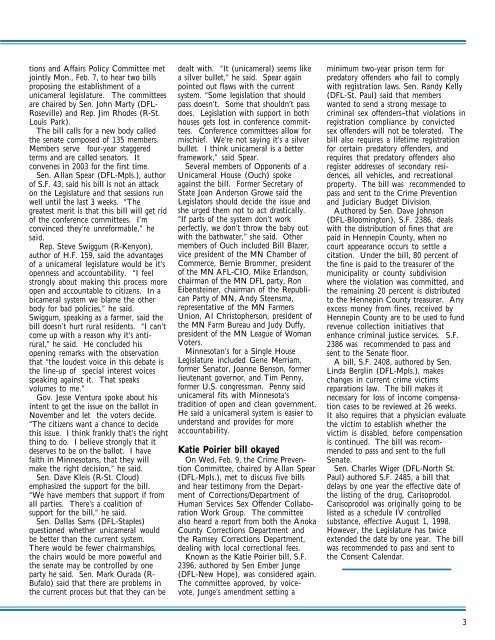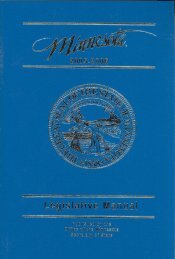Committee update - Minnesota State Legislature
Committee update - Minnesota State Legislature
Committee update - Minnesota State Legislature
Create successful ePaper yourself
Turn your PDF publications into a flip-book with our unique Google optimized e-Paper software.
tions and Affairs Policy <strong>Committee</strong> met<br />
jointly Mon., Feb. 7, to hear two bills<br />
proposing the establishment of a<br />
unicameral legislature. The committees<br />
are chaired by Sen. John Marty (DFL-<br />
Roseville) and Rep. Jim Rhodes (R-St.<br />
Louis Park).<br />
The bill calls for a new body called<br />
the senate composed of 135 members.<br />
Members serve four-year staggered<br />
terms and are called senators. It<br />
convenes in 2003 for the first time.<br />
Sen. Allan Spear (DFL-Mpls.), author<br />
of S.F. 43, said his bill is not an attack<br />
on the <strong>Legislature</strong> and that sessions run<br />
well until the last 3 weeks. “The<br />
greatest merit is that this bill will get rid<br />
of the conference committees. I’m<br />
convinced they’re unreformable,” he<br />
said.<br />
Rep. Steve Swiggum (R-Kenyon),<br />
author of H.F. 159, said the advantages<br />
of a unicameral legislature would be it’s<br />
openness and accountability. “I feel<br />
strongly about making this process more<br />
open and accountable to citizens. In a<br />
bicameral system we blame the other<br />
body for bad policies,” he said.<br />
Swiggum, speaking as a farmer, said the<br />
bill doesn’t hurt rural residents. “I can’t<br />
come up with a reason why it’s antirural,”<br />
he said. He concluded his<br />
opening remarks with the observation<br />
that “the loudest voice in this debate is<br />
the line-up of special interest voices<br />
speaking against it. That speaks<br />
volumes to me.”<br />
Gov. Jesse Ventura spoke about his<br />
intent to get the issue on the ballot in<br />
November and let the voters decide.<br />
“The citizens want a chance to decide<br />
this issue. I think frankly that’s the right<br />
thing to do. I believe strongly that it<br />
deserves to be on the ballot. I have<br />
faith in <strong>Minnesota</strong>ns, that they will<br />
make the right decision,” he said.<br />
Sen. Dave Kleis (R-St. Cloud)<br />
emphasized the support for the bill.<br />
“We have members that support if from<br />
all parties. There’s a coalition of<br />
support for the bill,” he said.<br />
Sen. Dallas Sams (DFL-Staples)<br />
questioned whether unicameral would<br />
be better than the current system.<br />
There would be fewer chairmanships,<br />
the chairs would be more powerful and<br />
the senate may be controlled by one<br />
party he said. Sen. Mark Ourada (R-<br />
Bufalo) said that there are problems in<br />
the current process but that they can be<br />
dealt with. “It (unicameral) seems like<br />
a silver bullet,” he said. Spear again<br />
pointed out flaws with the current<br />
system. “Some legislation that should<br />
pass doesn’t. Some that shouldn’t pass<br />
does. Legislation with support in both<br />
houses gets lost in conference committees.<br />
Conference committees allow for<br />
mischief. We’re not saying it’s a silver<br />
bullet. I think unicameral is a better<br />
framework,” said Spear.<br />
Several members of Opponents of a<br />
Unicameral House (Ouch) spoke<br />
against the bill. Former Secretary of<br />
<strong>State</strong> Joan Anderson Growe said the<br />
Legislators should decide the issue and<br />
she urged them not to act drastically.<br />
“If parts of the system don’t work<br />
perfectly, we don’t throw the baby out<br />
with the bathwater,” she said. Other<br />
members of Ouch included Bill Blazer,<br />
vice president of the MN Chamber of<br />
Commerce, Bernie Brommer, president<br />
of the MN AFL-CIO, Mike Erlandson,<br />
chairman of the MN DFL party, Ron<br />
Eibensteiner, chairman of the Republican<br />
Party of MN, Andy Steensma,<br />
representative of the MN Farmers<br />
Union, Al Christopherson, president of<br />
the MN Farm Bureau and Judy Duffy,<br />
president of the MN League of Woman<br />
Voters.<br />
<strong>Minnesota</strong>n’s for a Single House<br />
<strong>Legislature</strong> included Gene Merriam,<br />
former Senator, Joanne Benson, former<br />
lieutenant governor, and Tim Penny,<br />
former U.S. congressman. Penny said<br />
unicameral fits with <strong>Minnesota</strong>’s<br />
tradition of open and clean government.<br />
He said a unicameral system is easier to<br />
understand and provides for more<br />
accountability.<br />
Katie Poirier bill okayed<br />
On Wed, Feb. 9, the Crime Prevention<br />
<strong>Committee</strong>, chaired by Allan Spear<br />
(DFL-Mpls.), met to discuss five bills<br />
and hear testimony from the Department<br />
of Corrections/Department of<br />
Human Services Sex Offender Collaboration<br />
Work Group. The committee<br />
also heard a report from both the Anoka<br />
County Corrections Department and<br />
the Ramsey Corrections Department,<br />
dealing with local correctional fees.<br />
Known as the Katie Poirier bill, S.F.<br />
2396, authored by Sen Ember Junge<br />
(DFL-New Hope), was considered again.<br />
The committee approved, by voicevote,<br />
Junge’s amendment setting a<br />
minimum two-year prison term for<br />
predatory offenders who fail to comply<br />
with registration laws. Sen. Randy Kelly<br />
(DFL-St. Paul) said that members<br />
wanted to send a strong message to<br />
criminal sex offenders–that violations in<br />
registration compliance by convicted<br />
sex offenders will not be tolerated. The<br />
bill also requires a lifetime registration<br />
for certain predatory offenders, and<br />
requires that predatory offenders also<br />
register addresses of secondary residences,<br />
all vehicles, and recreational<br />
property. The bill was recommended to<br />
pass and sent to the Crime Prevention<br />
and Judiciary Budget Division.<br />
Authored by Sen. Dave Johnson<br />
(DFL-Bloomington), S.F. 2386, deals<br />
with the distribution of fines that are<br />
paid in Hennepin County, when no<br />
court appearance occurs to settle a<br />
citation. Under the bill, 80 percent of<br />
the fine is paid to the treasurer of the<br />
municipality or county subdivision<br />
where the violation was committed, and<br />
the remaining 20 percent is distributed<br />
to the Hennepin County treasurer. Any<br />
excess money from fines, received by<br />
Hennepin County are to be used to fund<br />
revenue collection initiatives that<br />
enhance criminal justice services. S.F.<br />
2386 was recommended to pass and<br />
sent to the Senate floor.<br />
A bill, S.F. 2408, authored by Sen.<br />
Linda Berglin (DFL-Mpls.), makes<br />
changes in current crime victims<br />
reparations law. The bill makes it<br />
necessary for loss of income compensation<br />
cases to be reviewed at 26 weeks.<br />
It also requires that a physician evaluate<br />
the victim to establish whether the<br />
victim is disabled, before compensation<br />
is continued. The bill was recommended<br />
to pass and sent to the full<br />
Senate.<br />
Sen. Charles Wiger (DFL-North St.<br />
Paul) authored S.F. 2485, a bill that<br />
delays by one year the effective date of<br />
the listing of the drug, Carisoprodol.<br />
Carisoprodol was originally going to be<br />
listed as a schedule IV controlled<br />
substance, effective August 1, 1998.<br />
However, the <strong>Legislature</strong> has twice<br />
extended the date by one year. The bill<br />
was recommended to pass and sent to<br />
the Consent Calendar.<br />
3
















